In Greek mythology, Cronus or Kronos was the youngest of the first generation of Titans, born out of Ouranos (Uranus or the sky, heaven) and Gaia (the earth). Cronus was seen as the primordial God of time, a force that destroys and consumes all. According to Hesiod in his Theogony, Cronus was jealous of his all powerful divine father Ouranos, the ruler of the universe. As he grew up, Cronus led a successful revolt against his father with the help of his mother and the other Titans. Eventually becoming the King of the Titans, Cronus took his sister Rhea as his wife and queen, and ushered in an era of peace and prosperity known as the mythological Golden Age. Cronus fathered 6 children with Rhea – Hestia, Hera, Demeter, Poseidon, Hades and Zeus. His children would one day overthrow his rule, imprison him in Tartarus (depths of the underworld) and be known as the Gods of Mt. Olympus. Cronos is usually depicted with a harpe, scythe or a sickle, the instrument he used to castrate and depose Ouronos. In ancient Greece, he was celebrated during the harvest festival of Kronia and temples dedicated to him have been found in Greece. Despite his fall from grace, Cronus continued to be revered as the patron of harvest due to his association with the Golden Age. The later Romans appropriated him as their deity Saturn, who was worshiped far more widely among the populace as the God of Agriculture. The last day of Judeo-Christian week has been named after Roman god Saturn being derived as Saturday from “Saturn’s Day”. Know more about the Legendary Titan Cronus with the 10 most famous myths that feature him.
#1 The First Generation of Titans
According to the Greek creation myth, the shapeless existence (Chaos) resolved itself over time into two forms. The rarer portion soared high and became the sky or the heavens, a vast and overarching dome, decorated with stars. The solid mass on the other hand became the flat earth, on whose outermost limits descended and rested the edges of the sky. The first primeval deities in Greek mythology were Ouranos (the father Sky) and Gaia (the mother Earth). As Ouronos and Gaia ruled the universe as King and Queen, they bore children which were identified in two primary races. The Giants who were gifted with brute strength, and the Titans who combined their physical vitality with an evolved intellect. The first generation of Titans born from the Sky and Earth were 12 in number, six daughters called Theia, Rhea, Themis, Mnemosyne, Phoebe and Tethys; and six sons who were named Oceanus, Ceos, Crios, Hyperion, Iapetus and Cronus. Cronus was the youngest among the first of the 12 Titans and arguably the strongest of them all.

#2 Castration of Ouronos (Uranus)
Before the birth of the Titans, Ouronos had sired six sons with Gaia. These were the 3 one eyed Cyclopses (Brontes, Arges and Steropes) and the three Hecatonchires (Briares, Cottus and Gyges), who each possessed a hundred hands and fifty heads. Terrified by the power and fierceness of his Giant sons, Ouronos felt threatened of his own position as the supreme deity and imprisoned them in Tartarus, the underworld deep inside the Earth (Gaia). This brought great pain and anger to Gaia who in time plotted the downfall of Ouronos with the help of the Titans. She went on to create a great stone sickle and persuaded her Titan sons to castrate their father. As the others feared him, it was Cronus who stepped up to the task. The plan was executed when Ouronos descended to lay with Gaia. He was held down firmly by his sons Crius, Coeus, Hyperion and Iapetus at the four corners of the earth. Finally Cronus wielded the adamantine sickle and castrated Ouranos. As Ouronos’ divine blood fell on the Earth it produced the Giants called Erinyes (the furies or the deities of vengeance) and the Meliae (nymphs of the ash tree). On the other hand his male organ which fell in the ocean produced a white foam from which emerged the goddess Aphrodite. The event led to Ouronos losing most of his powers, thus making way for Cronus to succeeded him as the supreme god of the Greek pantheon.
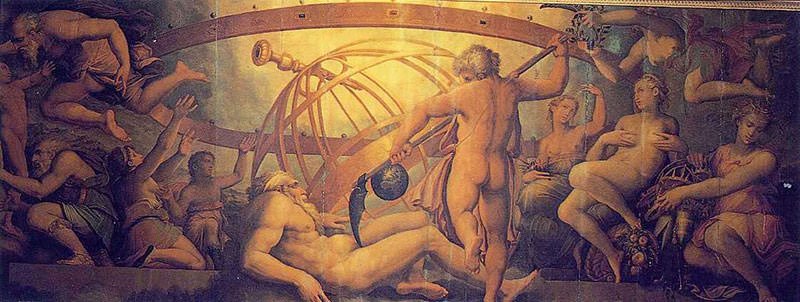
#3 The Golden Age
After defeating his father with the help of the Titans, Cronus took the mantle of the supreme deity. He then secured his position and re-imprisoned his powerful siblings the Hecatonchires and the Cyclopes in Tartarus, commanding the dragon Campe to guard them. Cronos took his sister Rhea as his Queen, and together they ruled over a period known as the mythological Golden Age. It was a time that saw limitless peace, prosperity, stability and harmony among all. When mankind lived among the gods and the world was in a state of eternal happiness. A period where there was no need for any laws, as immorality was absent among men. During this age, people did not have to work to feed themselves for the earth provided food in abundance. Beings lived to a ripe age maintaining their youthful appearance and when they eventually died peacefully, their spirits remained present on Earth, continuing on as “guardians” of the living.
#4 The Prophesy of Ouronos
As a defeated Ouronos ascended to the heavens he prophesied the fall of the Titans and the punishments they would suffer for their crimes. Ouronus thus cursed Cronus to meet the same fate as him, to be overthrown and discarded by his own progeny. As Cronus was about to become a father he began to grow restless about his father’s words. Hence in order to prevent the fulfillment of the prophesy Cronus swallowed each of his children; Hestia, Demeter, Hera, Hades and Poseidon, as they were born.
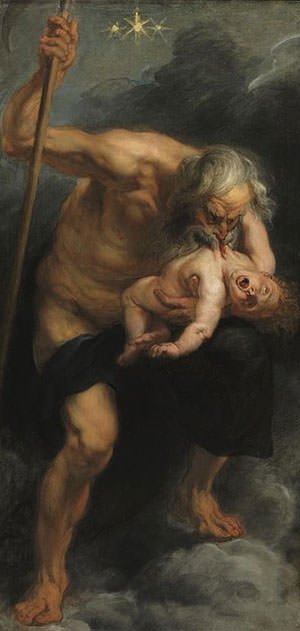
#5 Rhea’s Deception
As Cronus devoured his children one after the other, his wife Rhea grew sorrowful and reproachful of her husband and King. Soon when she became pregnant again with her youngest child Zeus, Rhea resolved to try and save the last of her offspring, to love and nurture. As she grew uneasy with each passing day Rhea consulted her parents Ouronos and Gaia, and decided to act on their advice. Thus when Zeus was born, she swaddled a stone in cloth, and Cronus in his eagerness swallowed the contraption without noticing Rhea’s deception.
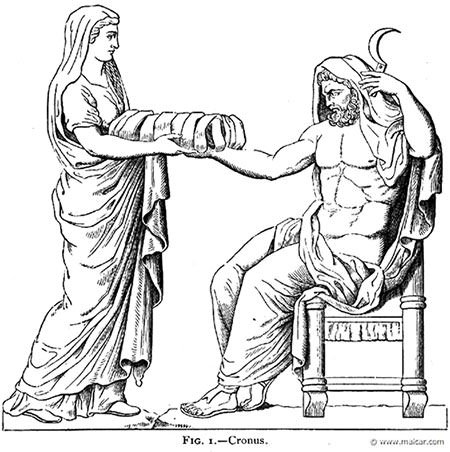
#6 Cronus And Philyra
Philyra was an Oceanid or a sea nymph, daughter of the Titans Ocenaus and Tethys. Philyra fell in love with her uncle Cronus and soon they were in a relationship. Once while they were having their rendezvous, Cronus’ wife Rhea walked upon them. To escape detection Cronus immediately transformed himself into a stallion and galloped off. As a result of this escapade, Philyra later gave birth to a son named Chiron, a child of half-human, half-equine shape. In shame for delivering a monstrous child, Philyra abandoned the baby and was transformed into a linden tree. Chiron on the other hand grew up to be an extraordinary being, and the wisest and most just of all the centaurs.
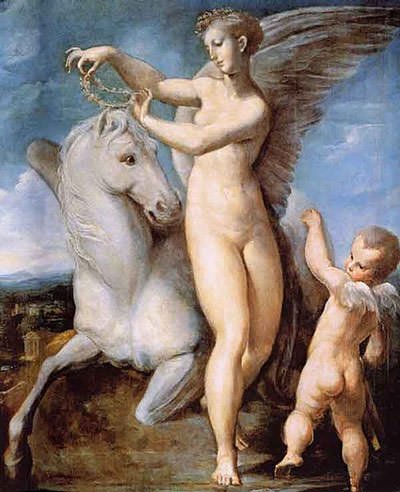
#7 Rebirth of The Olympians
Zeus was secretly kept hidden in the island of Crete, away from his father’s eyes. Here he was nourished, protected and educated by the nymphs and Curetes (priests of Rhea). Zeus soon grew up into an extraordinary young being with great physical powers, along with exemplary wisdom and intelligence. He was now determined to restore his brothers and sisters to the light of day and was assisted in this difficult task by the Metis (Goddess of wisdom, thought and skill). Metis persuaded Cronus to drink a potion which would make him undefeatable. As Cronus took in the spurious drink, he felt queasy and soon emitted out his children that he had swallowed. This was the rebirth of the 5 to be Olympians from the stomach of their father, now reborn in the reverse order. They were preceded by the counterfeit stone that was swallowed instead of Zeus which was placed on the earth at Pytho (Delphi) to be revered by the mortals.
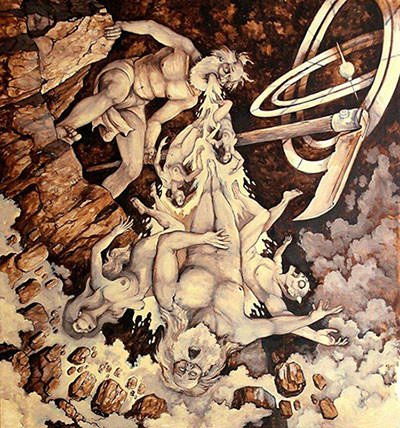
#8 Titanomachy
The rule of Cronus was finally challenged as prophesied, when Zeus along with his reborn siblings led a battle against him. Titanomachy or the War of the Titans was fought in Thessaly, between the older generation of Titans based on Mount Othrys, and the younger generation based on Mount Olympus. In the long drawn battles that lasted over 10 years, Zeus liberated and allied with the giants (Hecatonchires and the Cyclopes); who forged for the Olympians Zeus’s lighting bolts, Hade’s helmet and Poseidon’s’ trident. With the help of his powerful allies, Zeus eventually drove his enemies into the pit of Tartarus. Cronus himself was banished from his kingdom and displaced as the supreme power, which now vested in his son Zeus.
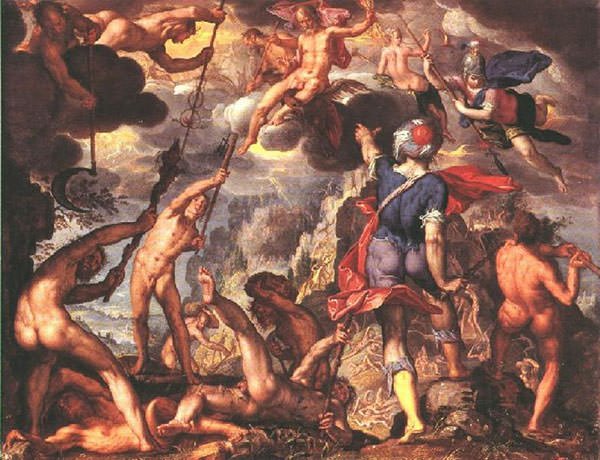
#9 King of Elysian Fields
According to certain Greek myths, Cronus was finally released from Tartarus in an act of benevolence by Zeus. He was then granted the domain of Elysian Fields or Elysium; a place for those chosen by the gods, the righteous and the heroic, where they would remain after death, to live a blessed and happy life, and indulging in whatever employment they had enjoyed in life.
#10 Cronus And Ammon, King of Libya
Diodorus Siculus an ancient Greek historian from Sicily (1st Century BC) relates a different Libyan story related to Cronus. According to the account, Ouranos and Titaea were the parents of the Titans, and Rhea was married to Ammon, the King of Libya. However, Rhea abandoned Ammon and married her younger brother Cronus, who in turn made war upon the King along with the other Titans. Cronus thus became King of Libya but ruled harshly over his subjects. He was in time defeated by Ammon’s son Dionysus, who appointed Cronus’ and Rhea’s son, Zeus, as king of Egypt. Dionysus and Zeus later joined their forces to defeat the remaining Titans in Crete, and on the death of Dionysus, Zeus inherited all the kingdoms, becoming lord of the world.

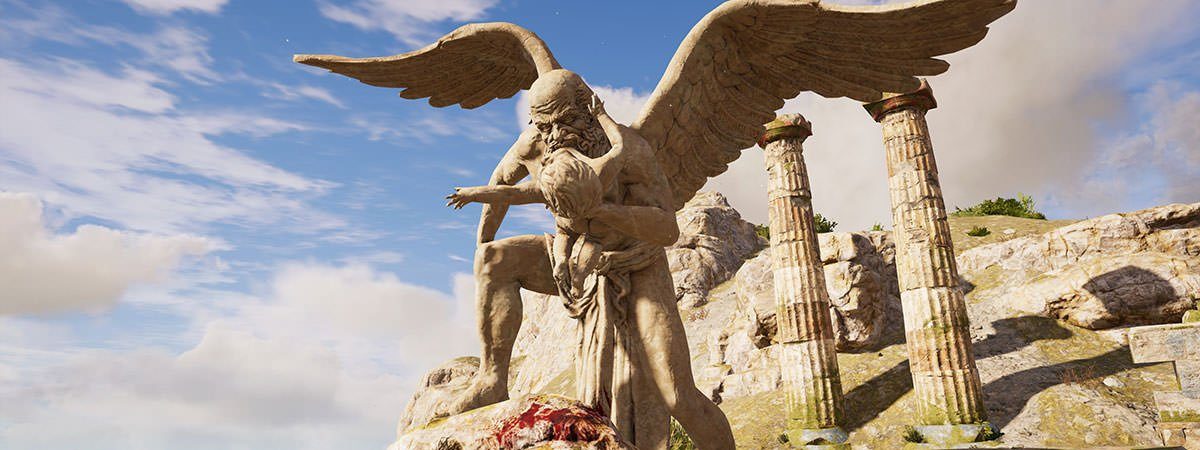
tell me facts i said facts for a reason be smart for once